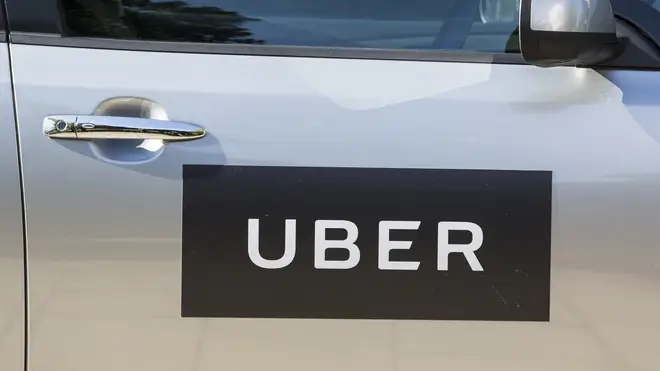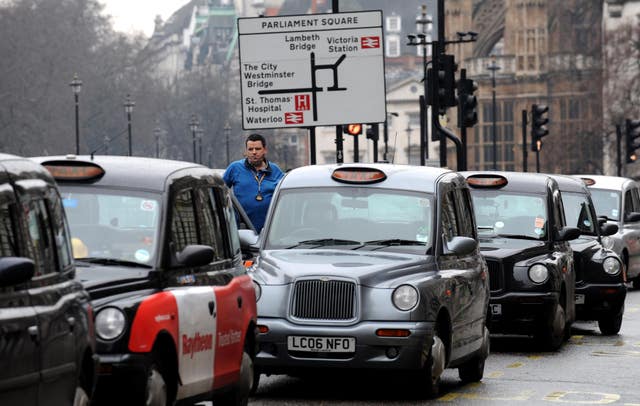
Lewis Goodall 10am - 12pm
28 September 2020, 16:14

A group representing black cab drivers condemned the decision by a judge who said Uber had ‘historical failings’.
Uber has been granted an 18-month licence to operate in London after a judge decided it was now a fit and proper company “despite historical failings”.
But the decision has been branded a “disaster” by a group representing black cab drivers which said the judge who made the ruling was “playing Russian roulette with the safety of Londoners”.
The ride-hailing company was denied a licence by Transport for London (TfL) in November 2019, citing breaches which compromised passenger safety and issues with transparency.
On Monday, deputy chief magistrate Tan Ikram ruled Uber is now suitable to hold an operator licence after hearing three days of arguments at Westminster Magistrates’ Court.
In his judgment, Judge Ikram said: “Despite their historical failings, I find them, now, to be a fit and proper person to hold a London (Private Hire Vehicle) operator’s licence.”
The Licensed Taxi Drivers’ Association (LTDA), which represents black cab drivers, claimed Uber had “managed to pull the wool over the eyes of the court”.
In a statement, the LTDA said: “The judge himself has recognised that Uber has more to do, noting that ULL is ‘not perfect’ but ‘improving’ and has ‘reduced incidents’.
“He is setting a very low bar for a company whose track record clearly shows it can’t be trusted to disclose serious incidents and one that has consistently failed to do the right thing.
“He is playing Russian roulette with the safety of Londoners and I fear it’s only a matter of time until the next incident.”

It added: “Sadly, it seems that Uber is too big to regulate effectively, but too big to fail.”
Judge Ikram said he took Uber’s “track record of regulation breaches” into account but recognised the company had made efforts to address failings and had improved standards.
He added: “Uber does not have a perfect record but it has been an improving picture.
“The test as to whether Uber are a ‘fit and proper person’ does not require perfection.
“I am satisfied that they are doing what a reasonable business in their sector could be expected to do, perhaps even more.”
The LTDA had argued Uber had attempted to conceal the scale of a fraud which allowed 14,788 rides by unauthorised drivers.
The court previously heard a “sophisticated gang” had exploited a vulnerability in Uber’s systems which allowed unauthorised people to upload their photographs to legitimate driver accounts, enabling them to pick up passengers.
Uber’s management of the issue was accepted as inadequate by the app’s regional general manager for Northern and Eastern Europe, Jamie Heywood.
The decision to grant Uber the licence has been criticised in light of this fraud.
Liam Griffin, chief executive of taxi firm Addison Lee, said: “This is the second time Uber have been deemed unfit by the regulator for serious safety breaches and yet again they have been granted a reprieve, which we believe puts passengers at risk.
“Safety is fundamental to the private hire industry, and these breaches are evidence that Uber is unable to guarantee its passengers that they know who is driving them and their families around London.”
The court heard Uber have also launched “an assault on the problem of manual error” which led to the belated dismissal of three drivers accused of sexual misconduct.
Our statement on today's appalling decision by Westminster Magistrates Court to grant Uber a licence to operate in London. Uber too big to regulate, but too big to fail: pic.twitter.com/71CdLd99LR
— The LTDA (@TheLTDA) September 28, 2020
Judge Ikram later discussed issues of document and insurance fraud which had been raised during the hearings, acknowledging Uber had tightened up their review processes.
Uber will now be subject to 21 conditions on their licence, including providing regular, independent reports to TfL.
Marie Demetriou QC, for TfL, said, given the nature of the previous breaches and the short period of time since some of Uber’s improvements, the conditions would allow TfL to keep a “close eye” on the app.
Judge Ikram granted the licence for the 18-month period, telling the court: “Improvements are new and I think there is great benefit in this case of the regulator TfL having the benefit of licence conditions.”
Uber will pay £374,770 to TfL for costs within 28 days.
TfL first refused to renew the company’s licence in September 2017, but the firm was handed a 15-month licence by a judge in June 2018 after it took the case to court.
It was then given a further two-month licence in September 2019, after which TfL rejected Uber’s application.
Judge Ikram was not asked to rule on whether TfL’s decision was correct, but whether Uber was now suitable for the licence.
Tim Ward QC, for Uber London Ltd, argued that denying the company a licence would have a “profound effect” on groups at risk of street harassment such as women and ethnic minorities, as well as disabled people.
“London is a safer place with Uber in the market than without it,” Mr Ward said.
Following the decision, Mr Heywood said: “This decision is a recognition of Uber’s commitment to safety and we will continue to work constructively with TfL.
“There is nothing more important than the safety of the people who use the Uber app as we work together to keep London moving.”
Mayor of London Sadiq Khan assured Londoners that TfL would “continue to closely monitor Uber and will not hesitate to take swift action should they fail to meet the strict standards required to protect passengers”.